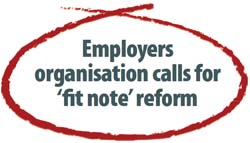In conversations up and down the land with removal companies a common theme has emerged: the difficulty in recruiting good staff.
Even considering the high rate of unemployment, getting the right people seems increasingly difficult. Often the high number of applicants gets in the way, fogging the process of recruitment making the good people more difficult to spot.
In this feature The Mover has asked for contributions from those in the recruitment business to provide a little advice for employers and applicants alike.
Removal Recruitment – the real alternative to employing full-time staff

Belying its title, Removal Recruitment specialises in supplying top quality agency staff for removal companies on a temporary basis. The nature of the removal business means that work can be sporadic and in times of recession, excess staff are an expense that most companies can ill afford.
Directors Paul Dyde and Lesley Crumpton pride themselves on providing trained staff at competitive rates specifically for removal companies who benefit from reduced permanent staffing levels and associated costs.
Removals experts Paul and Lesley started the business in 2001 and unlike their non-specialist competitors have devised their own training scheme to prepare staff for work in the removals industry. “Staff who are provided by standard agencies are not screened for ability or reliability and are not trained for the removal industry,” said Lesley. “This often causes problems out in the field. We make sure that our staff have been selected locally, have the right attitude and are willing to learn the skills required to provide an excellent service to clients. All our staff undergo a full in-house induction and training programme, covering health and safety, fire safety, risk management and PPE requirements.”
“For domestic moves the focus is on lifting and handling; packing of delicate goods and customer care,” said Paul. “It’s also important that staff know how to relate with customers and we’re keen to make sure our people have the right attitude.”
“For commercial moves our staff are taught to pack crates safely and how to move files. Staff can develop further with specialist skills training in IT moving which enables their earning potential to increase because they are of more value to removal clients.”
Removal Recruitment does not have a direct competitor as they are unique in their sector and are trying to shake off the concerns many removals companies have about using agency staff.
Paul and Lesley are surprised more removal companies don’t use more temporary staff. “We provide professional, uniformed removal staff without the overheads and the problems associated with untrained individuals at a very competitive rate which will save them money. If you have a reliable source of trained temporary staff you need only employ enough permanent people for your immediate needs, that makes good business sense, especially when times are tough.”
Paul said that employers are often not aware of the true cost of employing people. The headline rate of employing temporary staff might look high but it doesn’t work out that way when all the costs (including NI, holidays, pensions, and employee benefits) are taken into account.
Lesley sends out an availability list to all her clients every Monday morning, so her customers may book staff for the next day or in advance. Removal Recruitment is completely neutral and makes sure that confidentiality agreements and contracts are in place for all their customers.
Removal Recruitment is an affiliated member of BAR, but Lesley is disappointed by the level of interest from BAR members. “We hoped that members of the Association would use our services, but most will not entertain the use of agency staff in their operations. I can understand their concerns, but our experience in the removals business and the care we take with our recruitment and training sets us apart from the non specialist agencies.”
Removal Recruitment’s approach to staff training has won them the Investors in People Bronze award which is a great achievement for a company of its size. Staff have the chance to gain certificates in construction site safety (CSCS) and IT, which offers benefits to commercial clients.
Historically removals companies have always been reluctant to use agency staff, probably fearing that using unskilled labour would put their reputations at risk. However, after ten years as a specialist supplier to the industry and its focus on quality and training Removals Recruitment offers a solution to the problem of controlling staffing levels and labour costs.
In these times of uncertainty in the property market, pressure on margins and ever increasing transport costs, it may be time to take another look?
 A survey by manufacturer’s organisation the EEF has shown that 58 per cent of employers did not think the introduction of the ‘fit note’ had helped them to manage absence.
A survey by manufacturer’s organisation the EEF has shown that 58 per cent of employers did not think the introduction of the ‘fit note’ had helped them to manage absence.
In addition, employers reported reduced contact with GPs during the last year with only 5 per cent having spoken to them about making adjustments to the workplace to allow workers to return to work: this compares with 15 per cent during 2010 when the scheme was introduced.
The EEF is calling for more training for GP’s to encourage more of them to use the ‘may be fit for work’ option. It is also calling for the government to introduce tax incentives to encourage employers to invest in rehabilitation measures as recommended by the recent Frost/Black report into sickness and absence.
UKCES survey shows lack of training is derailing recovery

A survey by the UK Commission for Employment and Skills (UKCES) has shown that a lack of training in skilled trades is derailing the recovery by making vacancies hard to fill. However, despite this, the survey found that many employers were reluctant to provide training for their staff preferring to spend more on advertising and recruitment to fill vacancies. In the transport communication and business sectors only around half provided any training at all while in areas like education, health and public administration more than 80% of employers had trained their staff in the past year.
Skills Minister John Hayes said, “Businesses well equipped with the skills that training brings are most likely to succeed. We know that businesses that don’t train their staff are twice as likely to fail and there’s a very strong link between low skills, poverty and unemployment.”
“My mission is to reshape the character of learning and workforce skills. That is why this government has helped 457,000 people start apprenticeships last year and we’re aiming for half a million. We know that businesses that invest in skills improve their bottom line and the health of the nation.”
“Some employers are outstanding at training their staff, but many are not,” said Jeremy Anderson, Chairman of Global Financial Services at KPMG and a UKCES commissioner. “This has led to the development of so-called ‘skills potholes’ – areas, sectors or occupations which are suffering from deep, painful and persistent skills gaps. Like potholes they are often ignored, but risk making the road to economic recovery throughout the UK bumpier and slower than it needs to be.” He encouraged firms to look upon training as an investment rather than a cost.
 High unemployment in the UK could be eased by restricting the movement of workers from Europe, Labour MP Frank Field told Parliament recently. Mr Field made his remarks to Immigration Minister Damian Green following the release of government data which revealed that one in five unemployed households included someone who had never worked.
High unemployment in the UK could be eased by restricting the movement of workers from Europe, Labour MP Frank Field told Parliament recently. Mr Field made his remarks to Immigration Minister Damian Green following the release of government data which revealed that one in five unemployed households included someone who had never worked.
“Is there not a case, while this recession lasts, for temporarily restricting movement generally from Europe, so that the government’s welfare reforms can have a fair wind?” Field said.
Mr. Green replied, “I do not think that closing off the European labour market would be appropriate in a recession, because it would presumably apply both ways, meaning that British workers looking for jobs in the rest of the EU would also be badly affected. He is quite right to suggest, however, that the problems of the British economy need to be solved at the same time as the severe problems in the Eurozone.”
Restrictions on the number of workers from outside the European Economic Area (EEA) were tightened by the government in 2010 when a temporary migrant limit was introduced. A permanent cap followed in April 2011. However there are currently no plans to restrict the movement of workers from the EU to the United Kingdom.
Write don’t e-mail. By Steve Jordan.
I was always told that first impressions count. When I was going for my first job after leaving school I had a bath, dressed smartly, had a hair cut, and even polished my shoes. Not so the youngsters of today by all accounts.
I have received requests for work by e-mail that start with ‘Dear The Mover’ and clearly have no idea what we do for a living. Now I know that the jobs market is tough, but I constantly hear moving companies say that finding the right people is a big headache for them – so there are jobs for those who make the grade.
E-mail might be great for general business communication, but when you are looking for a job – no, I think not. Most business people get hundreds of e-mails every day, most of which are of no interest. But old fashioned letters! I can’t remember the last time I got a letter from a real person.
So, the moral of the story is, if you are looking for a job, write, don’t e-mail. By all means send in a typewritten CV, that’s fine, but I would like a hand-written covering letter, addressed to me. It’s polite and, if nothing else it shows that the applicant is literate. It also shows that the person is prepared to take the time to find out my name and show a little initiative. In most businesses it’s easy to find people to do things for you – much harder to employ people to think.
So, if you are thinking of applying for a job, consider these:
- Find out as much as you can about the company before you go. It’s easy on the Internet so there’s no excuse.
- Write, in your best handwriting (as they used to say at school) to a particular person and make sure that you spell their name correctly. Make sure that the letter is obviously for them specifically, it’s not a standard letter you have just copied.
- Try to find something interesting about the company and comment on it. Everyone likes to be flattered but make sure your interest and appreciation is genuine.
- Don’t make spelling, grammatical or punctuation errors. If you do it shows that you don’t care about detail – no company wants that.
- Be a nag. If you don’t hear back from the company, give them a call. Even if you get a no thank you letter, if you really think you have something to offer, call them back and say so.
We all live in what has become known as ‘the communication age’. It’s ironic that with all the different forms of communication around, getting your message to the right people has rarely been harder. Perhaps, in our IT driven world, the best way just might be the old way.
 Good advice from Red Recruit
Good advice from Red Recruit
According to Red Recruit, one of the biggest problems when people write a CV is that they tell lies. Caroline Seear said that people often overstate what they have done and, more importantly perhaps, omit vitally important information.
 “It’s very common for people to miss out a whole period of employment,” she explained. Apparently they just expand the period of employment at either side to cover up a period of employment with a company that is not well respected or if they were dismissed. “It’s a really stupid thing to do,” said Caroline. “It’s a very small industry so everyone knows everyone else. We’ve been working in the moving sector for ten years so our own database will often throw up inaccuracies. If not, I find out straight away as soon as I follow up a reference.”
“It’s very common for people to miss out a whole period of employment,” she explained. Apparently they just expand the period of employment at either side to cover up a period of employment with a company that is not well respected or if they were dismissed. “It’s a really stupid thing to do,” said Caroline. “It’s a very small industry so everyone knows everyone else. We’ve been working in the moving sector for ten years so our own database will often throw up inaccuracies. If not, I find out straight away as soon as I follow up a reference.”
Of course any candidate using the agency will have their hand held throughout the process. But for those who are going it alone, Caroline’s advice is to make sure your CV is accurate (no typos) and truthful. “People should also outline their achievements – that’s really important.” Caroline explained that her company’s ethos is to build a long term relationship with its clients and so to let any untruth through on a CV would be totally unacceptable.
Pro-active companies doing best says Red Recruit
Caroline Seear from Red Recruit says that it’s clear that companies who promote themselves strongly, even in a poor market, are doing better that most.
Red Recruit works very closely with its clients to provide an in-depth service that studies their businesses needs and finds the right people for them. This has led Caroline and her colleague to notice that those companies that have maintained a high level of sales and promotional activity have a much greater need for new staff than those who do not.
It might seem obvious but many would argue that if the business is low there’s no point ion spending money chasing what little is there. But Caroline’s observations suggest otherwise. “When it gets quiet it’s the more aggressive sales companies that are successful. They increase their advertising, networking and promotion and do much better as a result.”